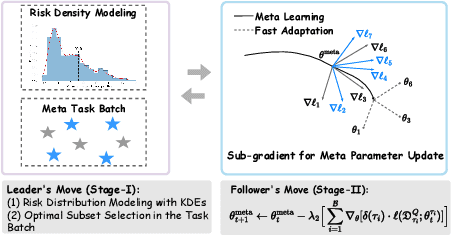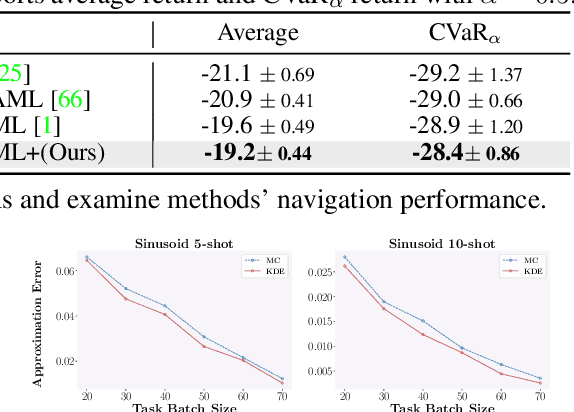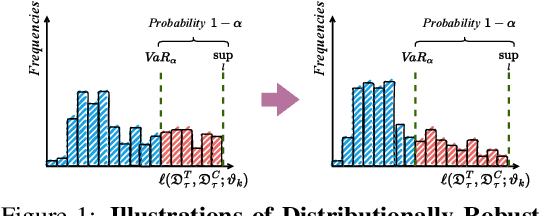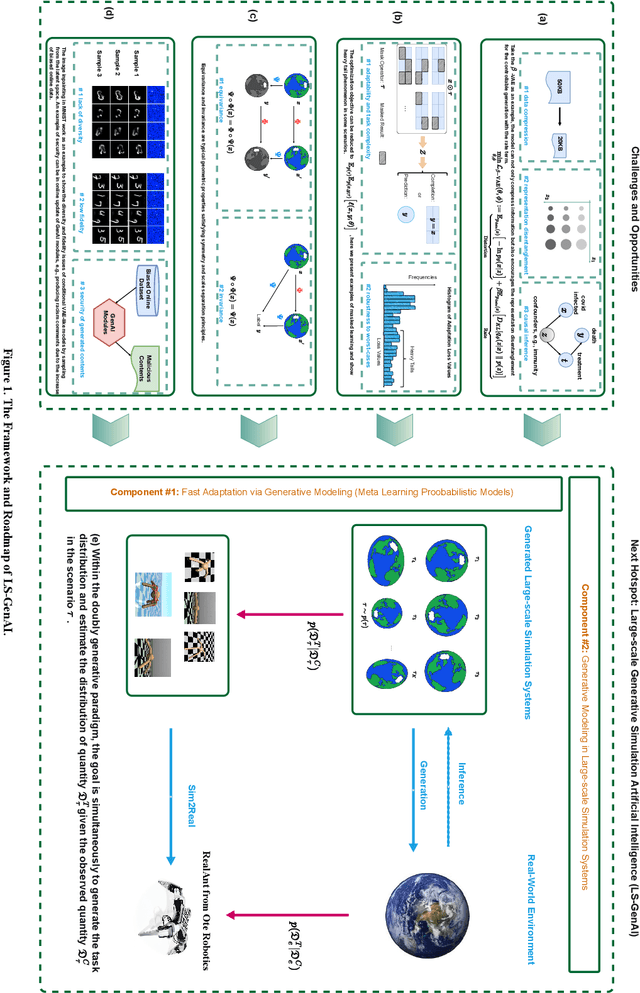Yiqin Lv
Enhancing Generative Auto-bidding with Offline Reward Evaluation and Policy Search
Sep 19, 2025Abstract:Auto-bidding is an essential tool for advertisers to enhance their advertising performance. Recent progress has shown that AI-Generated Bidding (AIGB), which formulates the auto-bidding as a trajectory generation task and trains a conditional diffusion-based planner on offline data, achieves superior and stable performance compared to typical offline reinforcement learning (RL)-based auto-bidding methods. However, existing AIGB methods still encounter a performance bottleneck due to their neglect of fine-grained generation quality evaluation and inability to explore beyond static datasets. To address this, we propose AIGB-Pearl (\emph{Planning with EvAluator via RL}), a novel method that integrates generative planning and policy optimization. The key to AIGB-Pearl is to construct a non-bootstrapped \emph{trajectory evaluator} to assign rewards and guide policy search, enabling the planner to optimize its generation quality iteratively through interaction. Furthermore, to enhance trajectory evaluator accuracy in offline settings, we incorporate three key techniques: (i) a Large Language Model (LLM)-based architecture for better representational capacity, (ii) hybrid point-wise and pair-wise losses for better score learning, and (iii) adaptive integration of expert feedback for better generalization ability. Extensive experiments on both simulated and real-world advertising systems demonstrate the state-of-the-art performance of our approach.
Fast and Robust: Task Sampling with Posterior and Diversity Synergies for Adaptive Decision-Makers in Randomized Environments
Apr 27, 2025Abstract:Task robust adaptation is a long-standing pursuit in sequential decision-making. Some risk-averse strategies, e.g., the conditional value-at-risk principle, are incorporated in domain randomization or meta reinforcement learning to prioritize difficult tasks in optimization, which demand costly intensive evaluations. The efficiency issue prompts the development of robust active task sampling to train adaptive policies, where risk-predictive models are used to surrogate policy evaluation. This work characterizes the optimization pipeline of robust active task sampling as a Markov decision process, posits theoretical and practical insights, and constitutes robustness concepts in risk-averse scenarios. Importantly, we propose an easy-to-implement method, referred to as Posterior and Diversity Synergized Task Sampling (PDTS), to accommodate fast and robust sequential decision-making. Extensive experiments show that PDTS unlocks the potential of robust active task sampling, significantly improves the zero-shot and few-shot adaptation robustness in challenging tasks, and even accelerates the learning process under certain scenarios. Our project website is at https://thu-rllab.github.io/PDTS_project_page.
Beyond Any-Shot Adaptation: Predicting Optimization Outcome for Robustness Gains without Extra Pay
Jan 19, 2025



Abstract:The foundation model enables fast problem-solving without learning from scratch, and such a desirable adaptation property benefits from its adopted cross-task generalization paradigms, e.g., pretraining, meta-training, or finetuning. Recent trends have focused on the curation of task datasets during optimization, which includes task selection as an indispensable consideration for either adaptation robustness or sampling efficiency purposes. Despite some progress, selecting crucial task batches to optimize over iteration mostly exhausts massive task queries and requires intensive evaluation and computations to secure robust adaptation. This work underscores the criticality of both robustness and learning efficiency, especially in scenarios where tasks are risky to collect or costly to evaluate. To this end, we present Model Predictive Task Sampling (MPTS), a novel active task sampling framework to establish connections between the task space and adaptation risk landscape achieve robust adaptation. Technically, MPTS characterizes the task episodic information with a generative model and predicts optimization outcome after adaptation from posterior inference, i.e., forecasting task-specific adaptation risk values. The resulting risk learner amortizes expensive annotation, evaluation, or computation operations in task robust adaptation learning paradigms. Extensive experimental results show that MPTS can be seamlessly integrated into zero-shot, few-shot, and many-shot learning paradigms, increases adaptation robustness, and retains learning efficiency without affording extra cost. The code will be available at the project site https://github.com/thu-rllab/MPTS.
Theoretical Investigations and Practical Enhancements on Tail Task Risk Minimization in Meta Learning
Oct 30, 2024



Abstract:Meta learning is a promising paradigm in the era of large models and task distributional robustness has become an indispensable consideration in real-world scenarios. Recent advances have examined the effectiveness of tail task risk minimization in fast adaptation robustness improvement \citep{wang2023simple}. This work contributes to more theoretical investigations and practical enhancements in the field. Specifically, we reduce the distributionally robust strategy to a max-min optimization problem, constitute the Stackelberg equilibrium as the solution concept, and estimate the convergence rate. In the presence of tail risk, we further derive the generalization bound, establish connections with estimated quantiles, and practically improve the studied strategy. Accordingly, extensive evaluations demonstrate the significance of our proposal and its scalability to multimodal large models in boosting robustness.
Group Distributionally Robust Optimization can Suppress Class Imbalance Effect in Network Traffic Classification
Sep 28, 2024



Abstract:Internet services have led to the eruption of traffic, and machine learning on these Internet data has become an indispensable tool, especially when the application is risk-sensitive. This paper focuses on network traffic classification in the presence of class imbalance, which fundamentally and ubiquitously exists in Internet data analysis. This existence of class imbalance mostly drifts the optimal decision boundary, resulting in a less optimal solution for machine learning models. To alleviate the effect, we propose to design strategies for alleviating the class imbalance through the lens of group distributionally robust optimization. Our approach iteratively updates the non-parametric weights for separate classes and optimizes the learning model by minimizing reweighted losses. We interpret the optimization steps from a Stackelberg game and perform extensive experiments on typical benchmarks. Results show that our approach can not only suppress the negative effect of class imbalance but also improve the comprehensive performance in prediction.
Robust Fast Adaptation from Adversarially Explicit Task Distribution Generation
Jul 28, 2024



Abstract:Meta-learning is a practical learning paradigm to transfer skills across tasks from a few examples. Nevertheless, the existence of task distribution shifts tends to weaken meta-learners' generalization capability, particularly when the task distribution is naively hand-crafted or based on simple priors that fail to cover typical scenarios sufficiently. Here, we consider explicitly generative modeling task distributions placed over task identifiers and propose robustifying fast adaptation from adversarial training. Our approach, which can be interpreted as a model of a Stackelberg game, not only uncovers the task structure during problem-solving from an explicit generative model but also theoretically increases the adaptation robustness in worst cases. This work has practical implications, particularly in dealing with task distribution shifts in meta-learning, and contributes to theoretical insights in the field. Our method demonstrates its robustness in the presence of task subpopulation shifts and improved performance over SOTA baselines in extensive experiments. The project is available at https://sites.google.com/view/ar-metalearn.
A Simple Yet Effective Strategy to Robustify the Meta Learning Paradigm
Oct 01, 2023



Abstract:Meta learning is a promising paradigm to enable skill transfer across tasks. Most previous methods employ the empirical risk minimization principle in optimization. However, the resulting worst fast adaptation to a subset of tasks can be catastrophic in risk-sensitive scenarios. To robustify fast adaptation, this paper optimizes meta learning pipelines from a distributionally robust perspective and meta trains models with the measure of expected tail risk. We take the two-stage strategy as heuristics to solve the robust meta learning problem, controlling the worst fast adaptation cases at a certain probabilistic level. Experimental results show that our simple method can improve the robustness of meta learning to task distributions and reduce the conditional expectation of the worst fast adaptation risk.
Large-scale Generative Simulation Artificial Intelligence: the Next Hotspot in Generative AI
Aug 03, 2023
Abstract:The concept of GenAI has been developed for decades. Until recently, it has impressed us with substantial breakthroughs in natural language processing and computer vision, actively engaging in industrial scenarios. Noticing the practical challenges, e.g., limited learning resources, and overly dependencies on scientific discovery empiricism, we nominate large-scale generative simulation artificial intelligence (LS-GenAI) as the next hotspot for GenAI to connect.
 Add to Chrome
Add to Chrome Add to Firefox
Add to Firefox Add to Edge
Add to Edge